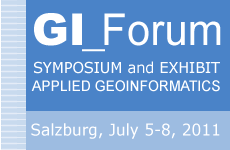 The 5th Geoinformatics Forum (July 5-8 2011), co-located with the highly regarded annual German language conference on Applied Geoinformatics (AGIT), was once again organized by the Centre of Geoinformatics (Z_GIS) at the University of Salzburg, the Institute for GIScience at the Austrian Academy of Sciences and the German University of Technology in Muscat, Oman.
The 5th Geoinformatics Forum (July 5-8 2011), co-located with the highly regarded annual German language conference on Applied Geoinformatics (AGIT), was once again organized by the Centre of Geoinformatics (Z_GIS) at the University of Salzburg, the Institute for GIScience at the Austrian Academy of Sciences and the German University of Technology in Muscat, Oman.
The conference organizers received an overwhelming response from all participants: “The 2011 GI-Forum aimed and attained new heights, by not only bringing together an international group of skilled, interesting, and energetic colleagues, but pushing forward the boundaries of our collective visions as to how GI can impact all sectors of society for a better future”, said keynote speaker Joseph Kerski from ESRI Inc. With over 1200 participants from 46 countries across the world, GI_Forum has become an annual event for vibrant GI community from academia, industry, and government to analyze progress and to explore new research directions.
High-quality Presentations and Workshops
The programme committee selected over 50 contributions to be presented in oral sessions, as workshops or poster presentations. These presentation formats facilitated the exchange of experience and enhanced discussion among presenters and audience. The programme comprised not just keynotes and presentations organised in 14 sessions but also a poster session and social events that created a good atmosphere.
Inspiring keynote speakers
The Gi_Forum was significantly enriched by four keynote speakers, distinguished researcher in the area of GIScience. The opening keynote, held by Joseph Kerski from ESRI Inc, USA focused on Learning with Geoinformation. His talk inspired the GI community and gave food for thought for further discussion throughout the conference. Jonathan Raper from the City University of London, UK, addressed the benefits of open geo data learned from London’s experience, with focus on the special role that GIScience plays in this area. Ian Dowman from the University College London, UK, spoke about integrating images with GIS and how this benefits the society”. The keynote “Understanding urban dynamics: unlocking the power of networks as collective sensors” held by Euro Beinat from the University of Salzburg inspired the audience and was followed by a stimulating penal discussion within the Real Time Forum.
Learning with GI: Implementing Digital Earth in Education
The 2011 edition of the international Learning with GI–Conference was held in collaboration with the digital-earth.eu network >www.digital-earth.eu, including presentations, workshops, poster presentations and special interest group meetings. Joseph Kerski talking about “Sleepwalking into the Future: The Case for Spatial Analysis Throughout Education” introduced the audience in an incredibly enthusiastic way to the possible input of the use of GI to educational outcomes. At the final Round Table session, international experts summed up and discussed results from the conference and indicated trends on where digital earth should move in education as part of the EU Digital Agenda 2020.
Workshop: Spatial Assessment and Analysis of Vulnerability
In the context of the GI-Forum 2011 a two-day pre-conference workshop was organised by the United Nations University – Institute for Environment and Human Security (UNU-EHS) and the Centre for Geoinformatics, University of Salzburg (Z_GIS). The topic of 8th meeting of the UNU-EHS Expert Working Group (EWG) on Measuring Vulnerability focussed on the assessment and mapping of the dynamics of vulnerability to natural hazards and climate change. One of the key objectives of the meeting was a fruitful exchange on current concepts and approaches on how to capture and evaluate vulnerability, risk and development trends in the light of natural hazards and climate change. Around 40 participants from five continents – including key IPCC authors – discussed the different approaches and further developed future research directions, ideas for publications and identified cooperation opportunities. Results of the workshop and the presentations will be made available in the upcoming week on the GI_Forum website: http://www.gi-forum.org/spatialvulnerability.